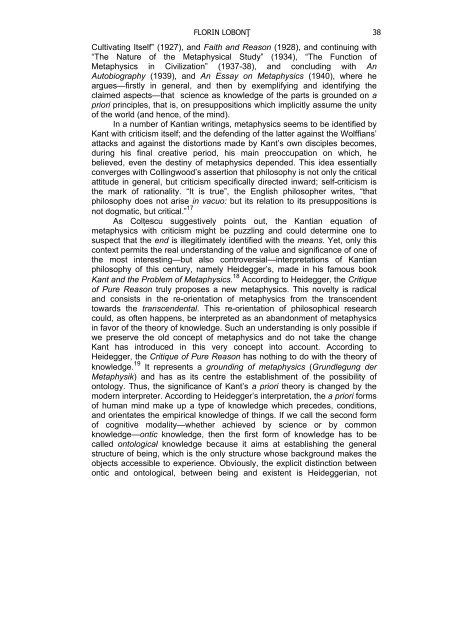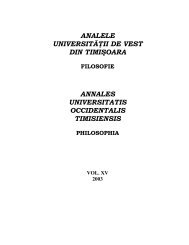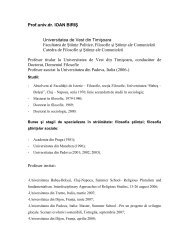VOL. IV (XXI) 2009 - Departamentul de Filosofie si Stiinte ale ...
VOL. IV (XXI) 2009 - Departamentul de Filosofie si Stiinte ale ...
VOL. IV (XXI) 2009 - Departamentul de Filosofie si Stiinte ale ...
You also want an ePaper? Increase the reach of your titles
YUMPU automatically turns print PDFs into web optimized ePapers that Google loves.
FLORIN LOBONŢ 38<br />
Cultivating Itself” (1927), and Faith and Reason (1928), and continuing with<br />
“The Nature of the Metaphy<strong>si</strong>cal Study” (1934), “The Function of<br />
Metaphy<strong>si</strong>cs in Civilization” (1937-38), and concluding with An<br />
Autobiography (1939), and An Essay on Metaphy<strong>si</strong>cs (1940), where he<br />
argues—firstly in general, and then by exemplifying and i<strong>de</strong>ntifying the<br />
claimed aspects—that science as knowledge of the parts is groun<strong>de</strong>d on a<br />
priori principles, that is, on presuppo<strong>si</strong>tions which implicitly assume the unity<br />
of the world (and hence, of the mind).<br />
In a number of Kantian writings, metaphy<strong>si</strong>cs seems to be i<strong>de</strong>ntified by<br />
Kant with criticism itself; and the <strong>de</strong>fending of the latter against the Wolffians’<br />
attacks and against the distortions ma<strong>de</strong> by Kant’s own disciples becomes,<br />
during his final creative period, his main preoccupation on which, he<br />
believed, even the <strong>de</strong>stiny of metaphy<strong>si</strong>cs <strong>de</strong>pen<strong>de</strong>d. This i<strong>de</strong>a essentially<br />
converges with Collingwood’s assertion that philosophy is not only the critical<br />
attitu<strong>de</strong> in general, but criticism specifically directed inward; self-criticism is<br />
the mark of rationality. “It is true”, the English philosopher writes, “that<br />
philosophy does not arise in vacuo: but its relation to its presuppo<strong>si</strong>tions is<br />
not dogmatic, but critical.” 17<br />
As Colţescu suggestively points out, the Kantian equation of<br />
metaphy<strong>si</strong>cs with criticism might be puzzling and could <strong>de</strong>termine one to<br />
suspect that the end is illegitimately i<strong>de</strong>ntified with the means. Yet, only this<br />
context permits the real un<strong>de</strong>rstanding of the value and <strong>si</strong>gnificance of one of<br />
the most interesting—but also controver<strong>si</strong>al—interpretations of Kantian<br />
philosophy of this century, namely Hei<strong>de</strong>gger’s, ma<strong>de</strong> in his famous book<br />
Kant and the Problem of Metaphy<strong>si</strong>cs. 18 According to Hei<strong>de</strong>gger, the Critique<br />
of Pure Reason truly proposes a new metaphy<strong>si</strong>cs. This novelty is radical<br />
and con<strong>si</strong>sts in the re-orientation of metaphy<strong>si</strong>cs from the transcen<strong>de</strong>nt<br />
towards the transcen<strong>de</strong>ntal. This re-orientation of philosophical research<br />
could, as often happens, be interpreted as an abandonment of metaphy<strong>si</strong>cs<br />
in favor of the theory of knowledge. Such an un<strong>de</strong>rstanding is only pos<strong>si</strong>ble if<br />
we preserve the old concept of metaphy<strong>si</strong>cs and do not take the change<br />
Kant has introduced in this very concept into account. According to<br />
Hei<strong>de</strong>gger, the Critique of Pure Reason has nothing to do with the theory of<br />
knowledge. 19 It represents a grounding of metaphy<strong>si</strong>cs (Grundlegung <strong>de</strong>r<br />
Metaphy<strong>si</strong>k) and has as its centre the establishment of the pos<strong>si</strong>bility of<br />
ontology. Thus, the <strong>si</strong>gnificance of Kant’s a priori theory is changed by the<br />
mo<strong>de</strong>rn interpreter. According to Hei<strong>de</strong>gger’s interpretation, the a priori forms<br />
of human mind make up a type of knowledge which prece<strong>de</strong>s, conditions,<br />
and orientates the empirical knowledge of things. If we call the second form<br />
of cognitive modality—whether achieved by science or by common<br />
knowledge—ontic knowledge, then the first form of knowledge has to be<br />
called ontological knowledge because it aims at establishing the general<br />
structure of being, which is the only structure whose background makes the<br />
objects acces<strong>si</strong>ble to experience. Obviously, the explicit distinction between<br />
ontic and ontological, between being and existent is Hei<strong>de</strong>ggerian, not




